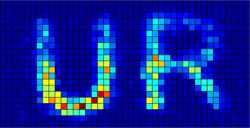This seems to be a pretty major breakthrough from what I understand of it. Very cool.Researchers at the University of Rochester have made an optics breakthrough that allows them to encode an entire image's worth of data into a photon, slow the image down for storage, and then retrieve the image intact.
While the initial test image consists of only a few hundred pixels, a tremendous amount of information can be stored with the new technique.

First image stored and retrieved from a single photon (Credit University of Rochester) Download hi-res photon image The image, a "UR" for the University of Rochester, was made using a single pulse of light and the team can fit as many as a hundred of these pulses at once into a tiny, four-inch cell. Squeezing that much information into so small a space and retrieving it intact opens the door to optical buffering—storing information as light.
"It sort of sounds impossible, but instead of storing just ones and zeros, we're storing an entire image," says John Howell, associate professor of physics and leader of the team that created the device, which is revealed in today's online issue of the journal Physical Review Letters. "It's analogous to the difference between snapping a picture with a single pixel and doing it with a camera—this is like a 6-megapixel camera."
"You can have a tremendous amount of information in a pulse of light, but normally if you try to buffer it, you can lose much of that information," says Ryan Camacho, Howell's graduate student and lead author on the article. "We're showing it's possible to pull out an enormous amount of information with an extremely high signal-to-noise ratio even with very low light levels."
Optical buffering is a particularly hot field right now because engineers are trying to speed up computer processing and network speeds using light, but their systems bog down when they have to convert light signals to electronic signals to store information, even for a short while.
Offering multiple perspectives from many fields of human inquiry that may move all of us toward a more integrated understanding of who we are as conscious beings.
Pages
▼
Sunday, January 21, 2007
One Step Closer to Quantum Computing
For years now, quantum computing has been a goal that seemed just outside our reach, but not anymore. This is from the University of Rochester News, found via Neatorama:
Tags:
No comments:
Post a Comment